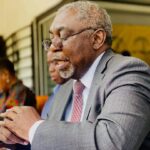At the 2025 AJC Global Forum, Zambian President Hakainde Hichilema delivered a landmark speech that positioned Zambia as a central figure in a growing trilateral alliance between Africa, Israel, and the United States. Speaking with clarity and conviction, President Hichilema emphasized shared values, innovation, and strategic opportunity—signaling Zambia’s rising role on the global diplomatic stage.
Here are five key takeaways from this pivotal moment in Zambia’s foreign relations:
1. Deepening Zambia–AJC Ties
President Hichilema reaffirmed Zambia’s strong and evolving relationship with the American Jewish Committee (AJC), particularly through its Africa Institute. He cited high-level engagements spanning Lusaka, New York, Washington, and Jerusalem as critical to fostering mutual trust and cooperation.
“Over the past few years, we have had opportunities to collaborate on many important matters,” he said. “As a country, we appreciate the opportunity to work closely with the AJC Africa Institute in South Africa.”
He also expressed gratitude for the AJC’s support during Zambia’s historic drought, calling it a prime example of “authentic partnership in times of crisis.”
2. Shared Democratic Values and Innovation
In his address, President Hichilema spotlighted the shared democratic ideals that bind Zambia, the United States, and Israel. He also emphasized the transformative role that innovation can play in unlocking Africa’s potential.
Zambia, he noted, is ready to collaborate with Israeli experts and American investors in key sectors such as agriculture, clean energy, and infrastructure—areas where innovation can directly improve livelihoods and economic performance.
3. Diplomatic Milestones and the Agritech Summit
A significant announcement from the Forum was Zambia’s selection to host the second AJC Agritech Summit in 2025. The summit will focus on sustainable agriculture and food security—key priorities for the region.
The event also anticipates the official opening of an Israeli embassy in Lusaka, a diplomatic milestone underscoring Israel’s commitment to deeper bilateral ties. “We also look forward to the opening of the Israeli embassy in Lusaka, and hope that AJC representatives will join us for this important milestone,” said President Hichilema.
AJC Africa Director Wayne Sussman echoed this optimism: “Zambia, with other African countries, the U.S., Israel and Abraham Accords partners, can find mutually beneficial agricultural solutions to ensure greater food security and development.”
4. Zambia as a Gateway for Investment
President Hichilema described Zambia as “open for investment and innovation,” inviting global partners to explore its untapped potential. With its strategic location and stable governance, Zambia is fast becoming a gateway for Israeli technology and U.S.-backed development efforts across southern Africa.
The president emphasized sectors such as water management, agritech, and renewable energy, where Israeli innovation aligns seamlessly with Zambia’s developmental needs.
5. A Resilient Partnership with Global Reach
Zambia’s diplomatic relationship with Israel dates back to 1964 and was restored in 1991. Today, this partnership is broader and more dynamic than ever, encompassing technology, education, agriculture, and beyond.
“This relationship can extend in areas such as health, water and the fight against desertification,” said Sussman. “Zambia has some of the greatest natural sites on the continent. There are so many ways the relationship can positively evolve and grow in the coming months and years.”
At a time when global diplomacy is rapidly shifting, Zambia is carving out a distinctive role as a bridge between Africa, Israel, and the United States. Through strategic alliances, shared values, and a vision of inclusive growth, Zambia is not only securing its own future—it is helping shape the future of global cooperation.
As President Hichilema made clear, this is more than diplomacy. It’s a movement powered by trust, innovation, and the unwavering belief in a better tomorrow.






